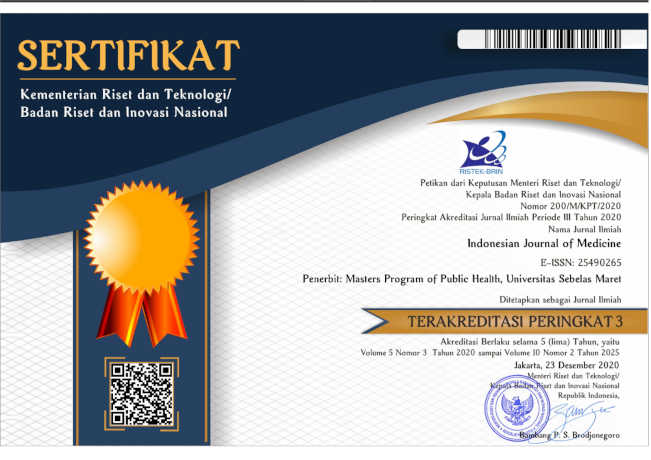Correlation between Family Support and Self Care in Type 2 Diabetes Mellitus: Meta-Analysis
DOI:
https://doi.org/10.26911/theijmed.2021.6.1.364Abstract
Background: Patients with Type 2 Diabetes Mellitus have a high risk of serious complications. Complications resulting from diabetes can be minimized and prevented by implementing self-care behavior. The study revealed that one of the factors that affect self-care activity is family support. The correlation of family support with self-care activity has been extensively investigated in several primary studies with several contradictions in the results. This study aimed to determine the correlation between family support and self-care activity in people with type 2 diabetes mellitus using the meta-analysis method.
Subjects and Method: This study was a systematic review and meta-analysis. The meta-analysis was carried out by systematically reviewing articles published from 2010 to 2020 from the Pubmed, Google Scholar, DOAJ, and Springer Link databases using search keywords, namely ("Family Support" OR "Social Support") AND ("Self Management "OR" Self Care ") AND" Diabetes Mellitus Type 2". Article searches were carried out using PICO. The study population was people with type 2 diabetes mellitus. Intervention/exposure was getting family support compared to not getting family support, and the outcome was diabetes mellitus self-care. The search for articles was carried out for one month. The articles included in this study were full-text articles with a cross-sectional design. Articles were reviewed using the PRISMA flow diagram guidelines. Articles analyzed using Revman 5.3 Software.
Conclusion: People with type 2 diabetes mellitus with good family support will increase self-care activity 2.22 times compared to people with type 2 diabetes mellitus who do not get family support. (aOR = 2.22 (95% CI = 1.84-2.68; p <0.001) The study of 7 articles originated from Africa.
Keywords: family support, self-care, diabetes mellitus type 2
Correspondence: Dian Dini Islami. Masters Program in Public Health, Universitas Sebelas Maret. Jl. Ir. Sutami 36A, Surakarta 57126, Central Java, Indonesia. Email: dian.dinii94@gmail.co. Mobile: 085729483960.
Indonesian Journal of Medicine (2021), 06(01): 62-70
https://doi.org/10.26911/theijmed.2021.06.01.07.
References
Alrahbi H (2014). Diabetes self-manage-ment (DSM) in Omani with type-2 diabetes. Int J Nurs Stud. 1(4): 352-359. https://doi.org/10.1016/j.ijnss.-2014.09.002.
Bilous R, Donelly R (2015). Buku Pegangan Diabetes (Ke-4). Bumi Medika.
Chali SW, Salih MH, Abate AT (2018). Self-care practice and associated factors among Diabetes Mellitus patients on follow up in Benishangul Gumuz Re-gional State Public Hospitals, Western Ethiopia: A cross-sectional study. BMC Res Notes. 11: 833. https://doi.org/10.1186/s13104-018-3939-8
D’Souza AL, Rajkumar C, Cooke J, Bulpitt CJ (2002). Probiotics in prevention of antibiotic-associated diarrhoea: Meta-analysis. BMJ. 324(7350): 1361. https://doi.org/10.1136/bmj.324.73-50.1361.
Garousi S (2013). Does perceived family support has a relation with depression and anxiety in an Iranian Diabetic Sample?. Int J Caring Sci, 6(3): 360–368.
Hidayati L (2017). Hubungan dukungan keluarga dengan self management pada penderita diabetes mellitus tipe 2. Thesis. Universitas Muhammadiyah Yogyakarta: Faculty of Medicine and Health Science.
Kisokanth G, Prathapan S, Indrakumar J, Joseph P (2013). Factors influencing self-management of Diabetes Melli-tus; A review article. J Diabetol. 4(3): 6.
Mayberry LS, Osborn CY (2012). Family support, medication adherence, and glycemic control among adults with type 2 diabetes. Diabetes Care. 35(6): 1239-45. https://doi.org/10.2337/dc-11-2103.
Mehravar F, Mansournia MA, Holakouie-Naieni K, Nasli-Esfahani E, Mansournia N, Almasi-Hashiani A (2016). Associations between diabetes self-management and microvascular com-plications in patients with type 2 diabetes. Epidemiol Health. 38: e20160-04.
https://doi.org/10.4178/epih/e2-016004.
Murti B (2018). Prinsip dan Metode Riset Epidemiologi. Karanganyar: Bintang Fajar Offset.
Pamungkas RA, Chamroonsawasdi K, Vatanasomboon P (2017). A systematic review: Family support integrated with diabetes self-management among uncontrolled type II diabetes mellitus patients. Behav Sci (Basel). 7(3): 62. https://doi.org/10.3390/bs-7030062.
Prasetyani D, Apriani E, Rahayu YSE (2018). Hubungan karakteristik, pengetahuan dan dukungan keluarga dengan kemampuan self-care pada pasien dm tipe 2 di Puskesmas Cilacap Tengah 1 dan 2. Jurnal Kesehatan Al-Irsyad. 9(1): 40–49.
Vaccaro JA, Exebio JC, Zarini GG, Huffman FG (2014). The role of family/friend social support in diabetes self-mana-gement for minorities with type 2 diabetes. J Nutr Health. 2(1): 1-9. https://doi.org/10.12691/jnh-2-1-1.











